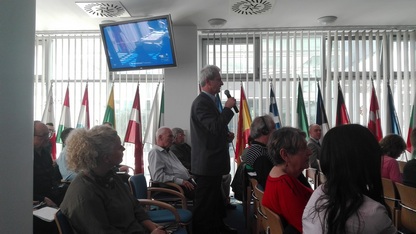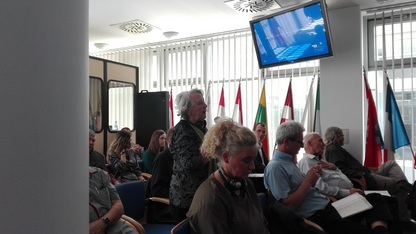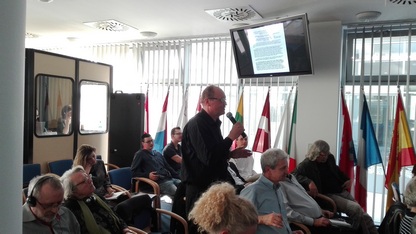Seminár: Quo vadis, Democracy?
Dátum: 20.03.2017
Seminar on democracy development and Russian propaganda in V4 region
Paradoxically, many people in Slovakia consider as weakness of democracy that there is the abuse of power and the government does not address social problems. It is a challenge to explain that not democracy is guilty but, on contrary, that we have not got far enough on our way to functioning democracy.
Peter Goliaš, Country report on the state and development of democracy in Slovakia, 28.2.2017
Goals:
- To discuss current developments in democracy with particular focus on Israel, USA, EU and V4 region. Are we moving from liberal to populist democracy? What are the threats and how to prevent negative developments?
- To discuss the influence of Russian propaganda using social media in V4 region. Is it really there and how influential it is? How does it communicate and with whom? What are the threats and how to prevent them?
Organizer:
INEKO – Institute for Economic and Social Reforms, Bratislava, Slovakia
Partners:
Israel Public Diplomacy Forum
Konrad Adenauer Stiftung
Date:
March 28th, 2017
Venue:
Representation of the European Commission in the Slovak Republic, Palisády 29, Bratislava, Slovakia
Language:
English/Slovak with simultaneous interpreting
Tentative agenda:
13:00 – 13:30 Registration
13:30 – 15:00 Panel 1: Are we moving from liberal to populist democracy?
Moderator: Peter Golias, INEKO Director
13:30 – 13:35 Peter Golias – Opening remarks
13:35 – 13:50 Livia Vasakova, Representation of the EC in Slovakia, Economic Counsellor
13:50 – 14:10 Eytan Gilboa, Israel Public Diplomacy Forum
14:10 – 14:25 Grigorij Meseznikov, Institute for Public Affairs
14:25 – 15:00 Discussion
15:00 – 15:15 Coffee break
15:15 – 17:00 Panel 2: What is the role of Russian propaganda in social media in V4 region?
Moderator: Grigorij Meseznikov, Institute for Public Affairs
15:15 – 15:20 Grigorij Meseznikov – Opening remarks
15:20 – 15:40 Lior Tabansky, Israel Public Diplomacy Forum
15:40 – 15:55 Hanspeter Weidenhammer, NATO Forces Integration Unit, Chief of Staff
15:55 – 16:10 Radovan Branik, activist, expert on extremism
16:10 – 17:00 Discussion
See also our country report on the state and development of democracy in Slovakia:
- Populism and corruption are threats to democracy in Slovakia (Country Report, 28.2.2017)
- Demokraciu na Slovensku ohrozuje populizmus a korupcia (Analýza, 28.2.2017)
Presentation of Eytan Gilboa

- Topic: “Indexing Democracy: The Israeli Experience “
- This lecture presents measuring methodologies and results used and produced by several research bodies including the Israel Institute of Democracy. Some comparisons will be made with the situation in the US. A critical analysis of “populist democracy” will also be offered.
Presentation of Lior Tabansky

- Topic: “Russia’s Influence Operations in Social Media and its relation to the Slovak/V4 region”
- Russia’s influence operations cause increasing policy concern. Lior analyzes the solid doctrinal foundation these operations rest upon; towards focusing on the underlying basic principles. We do not understand how mass influence works in the age of pervasive connectivity. The West needs bold interdisciplinary Social Science research to prevail.
Presentation of Lívia Vašáková

- The EU is currently facing unprecedented challenges in several fields. What is at stake and what can be done to reverse the trend of populism, extremism and eurosceptism?
Presentation of Grigorij Mesežnikov

- What is a quality of democracy in CEE countries, including Slovakia, in the third decade after the collapse of communism? What is the role of populism and populist politics? Is there a consensus on liberal-democratic reforms within the society and political class? What is the quality of elites (parties and party system?) How the institutions are functioning (problems with division of powers, rule of law, mechanisms of control, role of opposition, civil society, media? How consequent is the official line on the integration into collective West?
Presentation of Hanspeter Weidenhammer

- Topic: Mission and Role of NFIU in SVK (NATO Force Integration Unit in Slovakia) due to the changed security environment on the eastern and southern border of the Alliance.
- Introduction and Summary: Following the Russian military intervention in Ukraine and the annexation of the Ukrainian territory of Crimea by the Russian Federation in March 2014, NATO held the Wales Summit in Newport, Wales in September 2014. As part of the outcome of this summit, NATO and its Nations agreed to establish NATO Force Integration Units (NFIUs) on the territory of requesting eastern Allies. These requesting host nations (HN) are: BGR, EST, LVA, LTU, POL, ROU, HUN and SVK. NFIUs are one measure to enhance Alliance’s responsiveness. NFIU SVK is one of the six NATO Force Integration Units under operational Command and Control (C2) of MNC NE (Multinational Corps North East), specifically assigned to the SVK territory, with the primary responsibility to facilitate the rapid deployment of a Very High Readiness Joint Task Force (VJTF) and other eNRF (enhanced NATO Response Force) elements, sending a political message of Alliance indivisibility.
Presentation of Radovan Bránik












